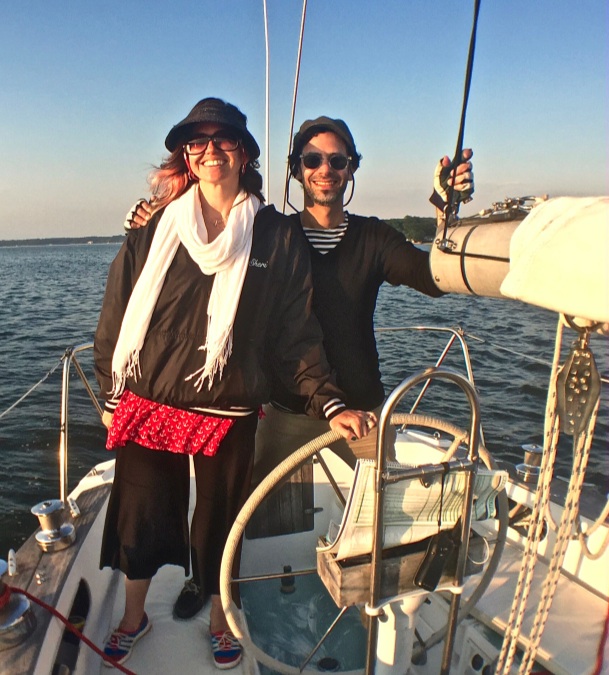…Grows together! And, stays together. (Or, they realize they shouldn’t be together and go their separate ways.)
Win/win.

“If you win, you win! If you lose, YOU STILL WIN! YOU CAN’T LOSE!!”
-Joe Pesci’s Joe LaMotta, in Raging Bull, advising Robert DeNiro’s Jake La Motta to take a particular fight due to both the merits and the politics.
We were reminded of the this recently when our Director and HBIC,* Captain Stephen Glenn Card, chimed in on a Facebook sailing forum. Someone posed a question about what size boat is good for learning. One can imagine what a can of worms that opened. Of course, this raised other issues. One member of the forum posted some opinions about how a sailing school program should run. (He used to do that for a living.) Captain Card agreed with much of what he said. But, he took another tack about one opinion: whether couples should learn together.
The poster basically said that any program worth going to automatically splits couples up into different boats. Our take? These days, that’s a crutch; instructors have to be able to deal with any “second instructorism” or tensions between any two or more people in the boat that arise for any reason. It’s rare that there are any. What does come up most often is when people try to help each other understand what’s going on, and that’s not limited to couples, or even people who already know each other.

We know of one high-volume school in the area that has a reputation for splitting couples up automatically. They have one of the worst school programs in the industry. We don’t know if other schools have a policy about this. What Captain Card knows is this: his father’s school (long since sold out of the family) did in fact used to do the same thing: split couples up. But, that was in the 1970’s and ’80’s! And, some couples resisted getting split. The times have changed, and teaching pedagogy and methodology – while scant in the sailing school industry – have a home here at New York Sailing Center. Our history spans ownership of two sailing schools since 1968, making this season our family’s Jubilee year: 50 years of owner/operation of schools and advising others.
What we also have done: participate in snowsports instruction, which started just after WWII and is much more evolved in teaching methodology than the sailing industry. But, that’s another story. The point is that the dynamic with couples had changed by the time Captain Card started his school (second Captain Card; second school), and sailing instruction had to change as well.

Why re-write what’s already been written? Here’s what Captain Card posted on the Facebook forum…
(*HBIC = Head Bozo In Charge)
“My father’s school had a policy of splitting couples up. That started somewhere between 1968 and 1970. My Dad was one of the original ‘Mad Men’ in the NY advertising scene before he started his sailing school; back in that day, from a professional perspective, he would have appreciated the famous campaign “You’ve come a long way, baby!” Prescient, if politically incorrect and poorly motivated by a tobacco company and the ad agency that spun it.
“But how far have we come if we still treat women differently when there’s no inherent need to? You point out the traditional scenario of a man at the helm and a woman at the bow. I agree that when there is situation involving heavy pulling and lifting, as men are usually physically larger and stronger than women, this is a reversal of the logical gender role. (When picking up floating mooring lines, or deploying an anchor on an electric windlass, this ought to be moot, but that’s a separate discussion.) Yes, I cringe when people yell from the back of the boat to the front, and the person at the front can’t hear and is yelling back.
“What I see less and less often compared to decades ago is a man angrily yelling at a timid woman. What I see more and more of is people yelling to be heard as they’re at opposite ends of the boat with wind interfering, and they should be using hand signals or headsets. (Sometimes it’s a woman in back and a man in front; sometimes it’s two men; sometimes it’s two women. Yes, too often, it’s the traditional roles you speak of.) I LOVE it when a woman is at the bow, calling the shots using hand signals or a wireless headset, and a man is following her specific and accurate instructions, and BOOM – the boat is moored, anchored or docked expertly with no fuss.

“What happens to a couple when they’re split up during class, and then rent or buy a boat together? They revert to the same patterns they would have demonstrated during class – but it wasn’t addressed when it needed to be. This comes up routinely with strangers, too. If we separate couples, family and friends, an instructor is left with strangers. Someone inevitably starts taking charge or becoming a second instructor. A good school and its instructors are going to have to deal with it. Can it be a little awkward? Yes. However, almost anytime we have to ask someone to let us be the instructor, etc, they’re genuinely apologetic and the situation is diffused – even if it happens a few more times. They start to intervene, catch themselves, zip it, smile sheepishly, and we laugh and continue. And, on rare occasions, it’s not as easy as that but we deal with it.
“Some couples function very well in learning environments, and it’s because they already understand each others’ learning preferences. When we start classes by discussing this, couples sometimes jump in and tell the instructor about each others’ preferences rather than their own. Due to this understanding, one will sometimes re-expalin something to the other after an instructor did but it did’t ‘take.’ Do we just step in and shut that down? Not when the recipient is receptive to it, and it’s productive both for the other student and the instructor who is playing catch-up on understanding how that person learns. It’s not black and white.

“It’s fine if women prefer the camaraderie of an all-female experience. If they’re doing that because they are tired of being dominated or yelled at by men, that’s unacceptable. It’s never sat well with me that women sometimes feel they have to have separate learning environments, or that educational institutions feel they have to create a service to accommodate that. To me, it’s always smacked of the even more insidious “separate but equal” blight on our society. Anyway, the alpha/beta dynamic is more universal and needs to be recognized and addressed across the board in this context.
“Now, a story or two. One time in a learn to sail schedule with three boats, another instructor approached me in the first break and said there was a problem with the dynamic of an unmarried couple on his boat. She was frustrated and upset, and the boyfriend was at least partially responsible. He asked if I’d switch some people around, or take her for a quick sail during the break. I chose the latter. We sailed briefly, and she was close to where she ought to have been at that point, but her confidence was not there. I told her she’s good enough to try singlehanding. I gave her a quick demo, and stayed out of the way while she singlehandedly sailed around our Obstacle Course. She was beaming. When we all headed back out for the next session, she told her boyfriend, “I just singlehanded the boat. Did you do that?” Vapid stare in response. Ha!
“Last season, a couple signed up for a weekday 101 course. They already owned an Ensign but didn’t know what to do with her. i was their instructor. There was no third student as a buffer so to speak, but they worked perfectly together. They sometimes discussed things while doing them to improve their understanding, but neither took over or dominated the other. It was a fine sight. They had a ball and were on pace with their skills that first day. For day 2, the wife picked me up at the subway station and her husband was coming from a different direction. We got to chatting, and got on the subject to dating and relationships. I told her about a problematic one that just ended for me, and opined that in some ways, perhaps men and women are wired differently, and that sometimes we process and express emotions differently. She wholeheartedly agreed. She then detailed how she sometimes catches herself expecting her husband to instantly know what’s she’s thinking and feeling without telling him, and becoming angry and resentful that he doesn’t just confirm this for her verbally. “He’s not a mindreader; it’s ridiculous. Yet I catch myself doing it, and letting resentment build up, before I realize I have to just tell him.” They’re both highly educated (doctors) and have lived in different countries together and separately.
“For what it’s worth… sorry it rambled on.
Have a great season!”

Want to explore learning together?